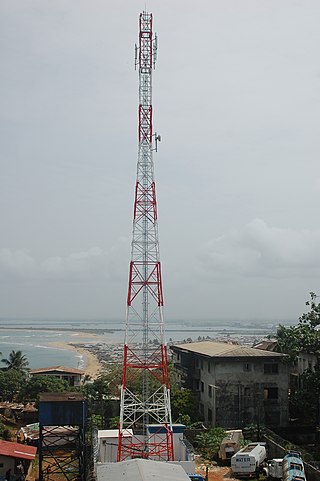
Mass media in Liberia include the press, radio, television, fixed and mobile telephones, and the Internet.
The mass media in Romania refers to mass media outlets based in Romania. Television, magazines, and newspapers are all operated by both state-owned and for-profit corporations which depend on advertising, subscription, and other sales-related revenues. The Constitution of Romania guarantees freedom of speech. As a country in transition, the Romanian media system is under transformation.
Telecommunications in Tanzania include radio, television, fixed and mobile telephones, and the Internet available in mainland Tanzania and the semiautonomous Zanzibar archipelago.

Mass media in Nigeria has an interesting and long history.

The Namibian Broadcasting Corporation (NBC) is the public broadcaster of Namibia. It was established in 1979, under the name South West African Broadcasting Corporation (SWABC).

The Commonwealth Broadcasting Association (CBA) is a representative body for public service broadcasters throughout the Commonwealth, founded in 1945. A not-for-profit non-government organisation, the CBA is funded by subscriptions from 102 members and affiliates from 54 countries. The stated goal of the CBA is to promote best practices in public service broadcasting and to foster freedom of expression. It also serves to provide support and assistance to its members through training, bursaries, consultancies, networking opportunities and materials for broadcast.

Mass media in Kenya includes more than 91 FM stations, more than 64 free to view TV stations, and an unconfirmed number of print newspapers and magazines. Publications mainly use English as their primary language of communication, with some media houses employing Swahili. Vernacular or community-based languages are commonly used in broadcast media; mostly radio.
The media of Zimbabwe has varying amounts of control by successive governments, coming under tight restriction in recent years by the government of Robert Mugabe, particularly during the growing economic and political crisis in the country. The Zimbabwean constitution promotes freedom of the media and expression, however this is hampered by interference and the implementation of strict media laws. In its 2008 report, Reporters Without Borders ranked the Zimbabwean media as 151st out of 173.

Mass media in Burundi mainly consists of radio, television, and printed resources, with a project underway to improve internet access to the country. Most mass media in Burundi is controlled by the government, and access to international mass media is limited.
The mass media in Cameroon includes independent outlets. The nation has only one national newspaper, which is state owned.
Mass media in Ivory Coast is controlled by the government. Audiovisual communications are regulated by the Conseil national de la communication audiovisuelle (CNCA), an administrative arm of the national government.
The mass media in Gabon is primarily monitored by the Gabon government. Although the main newspapers are associated with the government, there are private broadcasters, and private weekly newspapers that are mostly controlled by opposition parties.
The mass media in South Sudan is underdeveloped compared to many other countries, including fellow East African states like Kenya, Tanzania, and Uganda. Poor transportation infrastructure and entrenched poverty in the country inhibit both the circulation of newspapers, particularly in states located far from the capital of Juba, and the ability of media outlets to maintain regular coverage of the entire country.
Mass media in Malawi consist of several different types of communications media: television, radio, cinema, newspapers, magazines and Internet-based Web sites. Malawi also has a growing music industry. Media is either privately owned or government owned.
Mass media in Togo includes radio, television, and online and print formats. The Agence Togolaise de Presse news agency began in 1975. The Union des Journalistes Independants du Togo press association is headquartered in Lomé.
The Tanzanian Broadcasting Corporation is a television network. It is Tanzania's national network and is government-owned and operated.
Mass media in Namibia includes radio, television, and online and print formats.
Wasafi Classic Baby (WCB) is a Tanzania-based record label founded by musician Diamond Platnumz. WCB's commercial roster includes Diamond Platnumz, Mbosso, Zuchu, Lava Lava, Queen Darleen, and D Voice. The label is headquartered at Mbezi Beach, Dar Es Salaam. The label's Vice President is RJ The DJ, who is also Diamond Platnumz's official DJ, while the official producer of the label is Lizer Classic. In 2017, the WCB Wasafi artists released a joint project titled Zilipendwa, and in 2020, they released their second single titled Quarantine. In 2021, WCB Wasafi signed a publishing and distribution deal with Ziiki and Warner Music Group.







